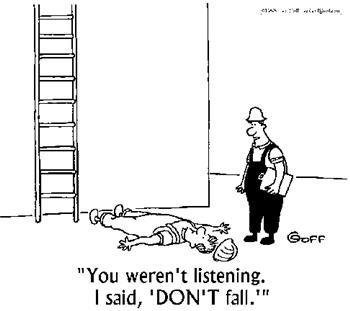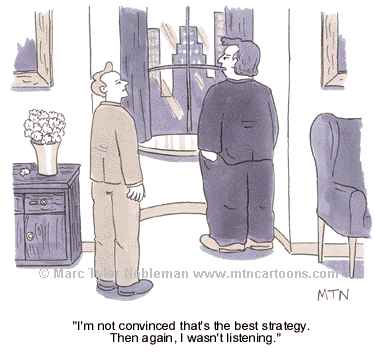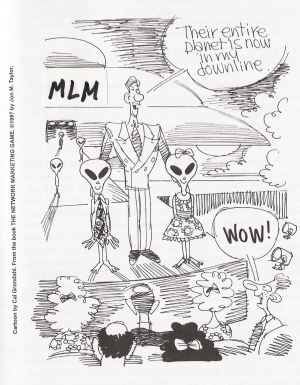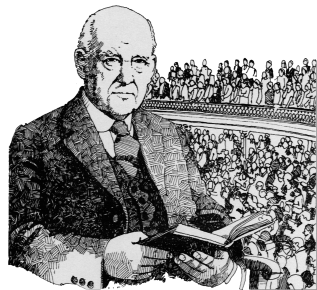 Dr Martyn Lloyd-Jones was a man of God who preached from the Bible at Westminster Chapel in London. I can personally tell you his two classic books—Sermon on the Mount and Spiritual Depression—changed my thinking and life. Lloyd-Jones sermons go past the mind and hit your heart. Nothing convicts me as much as reading a Lloyd-Jones sermon on a Biblical text. I will provide this example entitled God or Mammon. Remember, the goal of Sunday’s articles is to get you to think about eternity and eternal things. Don’t read this quickly, but digest contents of his sermon and examine your heart. Here is where I found the sermon article on the web. Worshiping God, loving others and thinking on His calling in our life is what Sundays are all about. Count your blessing and enjoy your Sunday. God Bless, Orrin Woodward
Dr Martyn Lloyd-Jones was a man of God who preached from the Bible at Westminster Chapel in London. I can personally tell you his two classic books—Sermon on the Mount and Spiritual Depression—changed my thinking and life. Lloyd-Jones sermons go past the mind and hit your heart. Nothing convicts me as much as reading a Lloyd-Jones sermon on a Biblical text. I will provide this example entitled God or Mammon. Remember, the goal of Sunday’s articles is to get you to think about eternity and eternal things. Don’t read this quickly, but digest contents of his sermon and examine your heart. Here is where I found the sermon article on the web. Worshiping God, loving others and thinking on His calling in our life is what Sundays are all about. Count your blessing and enjoy your Sunday. God Bless, Orrin Woodward
Do not lay up for yourselves treasures on earth, where moth and rust corrupt, and where thieves break through and steal, but lay up for yourselves treasures in heaven, where neither moth nor rust corrupt, and where thieves do not break through nor steal. For where your treasure is, there will your heart be also. The light of the body is the eye. If therefore your eye is single, your whole body shall be full of light. But if your eye is evil, your whole body shall be full of darkness. If therefore the light that is in you be darkness, how great is that darkness! No man can serve two masters, for either he will hate the one, and love the other, or else he will hold to the one, and despise the other. You cannot serve God and mammon (Matthew 6.19-24).
In our analysis of verses 19-24 we have seen that our Lord first of all lays down a proposition or a commandment, “Do not lay up for yourselves treasures on earth … but lay up for yourselves treasures in heaven.” In other words, He tells us that we are so to live in this world, and so to use everything we have, whether our possessions, or gifts, or talents, or propensities, that we shall be laying up for ourselves treasures in heaven.
Then, having given us the injunction in that way, our Lord proceeds to supply us with reasons for doing this. I would remind you again that here we have an illustration of the wonderful condescension and understanding of our blessed Lord. He has no need to give us reasons. It is for Him to command. But He stoops to our weakness, mighty as He is, and He comes to our aid and supplies us with these reasons for carrying out His commandment.
 He does so in a very remarkable manner. He elaborates the reasons and presses them on our consideration. He does not merely give us one reason. He gives us a number. He works it out for us in a series of logical propositions, and, of course, there can be no doubt at all but that He does this, not only because He is anxious to help us, but also, and still more perhaps, because of the desperate seriousness of the subject with which He is dealing. Indeed, we shall see that this is one of the most serious matters which we can ever consider together.
He does so in a very remarkable manner. He elaborates the reasons and presses them on our consideration. He does not merely give us one reason. He gives us a number. He works it out for us in a series of logical propositions, and, of course, there can be no doubt at all but that He does this, not only because He is anxious to help us, but also, and still more perhaps, because of the desperate seriousness of the subject with which He is dealing. Indeed, we shall see that this is one of the most serious matters which we can ever consider together.
Again we must remember that these words were addressed to Christian people. This is not what our Lord has to say to the unbeliever out in the world. This is the warning that He gives to the Christian. We are dealing here with the subject of worldliness, or worldly-mindedness, and the whole problem of the world, but we must cease to think of it in terms of people who are in the world outside. This is the peculiar danger of Christian people. At this point our Lord is dealing with them and nobody else.
You can argue if you like that if all this is true for the Christian, it is much more so for the non-Christian. That is a perfectly fair deduction. But there is nothing so fatal and tragic as to think that words like these have nothing to do with us because we are Christians. Indeed, this is perhaps the most urgent word that is needed by Christian people at this very moment. The world is so subtle, worldliness is such a pervasive thing, that we are all guilty of it, and often without realizing it. We tend to label worldliness as meaning certain particular things only, and always the things of which we are not guilty. We therefore argue that this has nothing to say to us.
But worldliness is all-pervasive, and is not confined to certain things. It does not just mean going to theatres or cinemas, or doing a few things of that nature. No, worldliness is an attitude towards life. It is a general outlook, and it is so subtle that it can come into the most holy things of all, as we saw earlier.
We might digress here for a moment and look at this subject from the standpoint of the great political interest in this country, particularly, for example, at the time of a General Election. What, in the last analysis, is the real interest? What is the real thing that people on both sides and all sides are concerned about? They are interested in “treasures on earth”, whether they be people who have treasures or whether they be people who would like to have them. They are all interested in the treasures, and it is most instructive to listen to what people say, and to observe how they betray themselves and the worldliness of which they are guilty, and the way in which they are laying up for themselves treasures on earth.
To be very practical (and if the preaching of the gospel is not practical it is not true preaching), there is a very simple test which we can apply to ourselves to see whether these things apply to us or not. When, at the time of a General or local Election, we are called on to make a choice of candidates, do we find ourselves believing that one political point of view is altogether right and the other altogether wrong? If we do, I suggest we are somehow or another laying up for ourselves treasures on earth. If we say that the truth is altogether on one side or the other, then if we analyze our motives we will discover it is because we are either protecting something or anxious to have something.
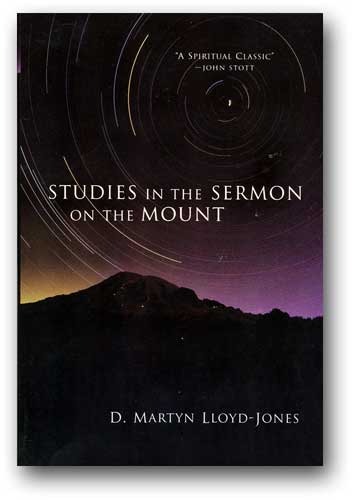 Another good way of testing ourselves is to ask ourselves quite simply and honestly why we hold our particular views. What is our real interest? What is our motive? What, when we are quite honest and truthful with ourselves, is really at the back of these particular political views that we hold? It is a most illuminating question if we are really honest. I suggest that most people will find if they face that question quite honestly, that there are some treasures on earth about which they are concerned, and in which they are interested.
Another good way of testing ourselves is to ask ourselves quite simply and honestly why we hold our particular views. What is our real interest? What is our motive? What, when we are quite honest and truthful with ourselves, is really at the back of these particular political views that we hold? It is a most illuminating question if we are really honest. I suggest that most people will find if they face that question quite honestly, that there are some treasures on earth about which they are concerned, and in which they are interested.
The next test is this. To what extent are our feelings engaged in this matter? How much bitterness is there, how much violence, how much anger and scorn and passion? Apply that test, and again we shall find that the feeling is aroused almost invariably by the concern about laying up treasures on earth.
The last test is this. Are we viewing these things with a kind of detachment and objectivity or not? What is our attitude towards all these things? Do we instinctively think of ourselves as pilgrims, and mere sojourners in this world, who of course have to be interested in these things while we are here? Such an interest is certainly right, it is our duty. But what is our ultimate attitude? Are we controlled by it? Or do we stand apart and regard it objectively, as something which is ephemeral, something which does not really belong to the essence of our life and being, something with which we are concerned only for a while, as we are passing through this life?
We should ask ourselves these questions in order that we may make quite certain whether this injunction of our Lord is speaking to us. Those are some of the ways in which we can find out very simply whether we are or are not guilty of laying up for ourselves treasures on earth, and not laying up for ourselves treasures in heaven.
When we come to consider our Lord’s arguments against laying up treasures on earth, we find that the first is one which we may very well describe as the argument of common sense, or of ordinary observation. “Lay not up for yourselves treasures upon earth.” Why? For this reason: “where moth and rust corrupt, and where thieves break through and steal”. But why should I lay up treasures in heaven? For this reason: “where neither moth nor rust corrupt, and where thieves do not break through nor steal”.
Our Lord is saying that worldly treasures do not last, that they are transitory, passing, ephemeral. “Change and decay in all around I see.” “Where moth and rust corrupt.”
How true it is. There is an element of decay in all these things, whether we like it or not. Our Lord puts it in terms of the moth and rust that tend to lodge themselves in these things and destroy them. Spiritually we can put it like this. These things never fully satisfy. There is always something wrong with them. They always lack something. There is no person on earth who is fully satisfied, and though in a sense some may appear to have everything that they desire, still they want something else. Happiness cannot be purchased.
There is, however, another way of looking at the effect of moth and rust spiritually. Not only is there an element of decay in these things, it is also true that we always tend to tire of them. We may enjoy them for a while, but somehow or other they begin to pall or we lose interest in them. That is why we are always talking about new things and seeking them. Fashions change. And though we are very enthusiastic about certain things for a while, soon they no longer interest us as they did. Is it not true that as age advances these things cease to satisfy us? Old people generally do not like the same things as young people, or the young the same as the old. As we get older these things seem to become different, there is an element of moth and rust.
We could even go further and put it more strongly and say that there is an impurity in them. At their best they are all infected. Do what you will you cannot get rid of the impurity. The moth and rust are there and all your chemicals do not stop these processes. Peter says a wonderful thing in this very connection, “Whereby are given to us exceeding great and precious promises; that by these you might be partakers of the divine nature, having escaped the corruption that is in the world through lust” (2 Peter 1.4). There is corruption in all these earthly things; they are all impure.
The last fact, therefore, about these things is that they inevitably perish. Your most beautiful flower is beginning to die immediately you pluck it. You will soon have to throw it away. That is true of everything in this life and world. It does not matter what it is, it is passing, it is all fading away. Everything that has life is, as the result of sin, subject to this process -“moth and rust corrupt”. Things develop holes and become useless, and at the end they are gone and become utterly corrupt. The most perfect physique will eventually give way and break down and die. The most beautiful countenance will in a sense become ugly when the process of corruption has got going. The brightest gifts tend to fade. Your great genius may be seen gibbering in delirium as the result of disease. However wonderful and beautiful and glorious things may be, they all perish. That is why, perhaps, the saddest of all failures in life is the failure of the philosopher who believes in worshipping goodness, beauty and truth. Because there is no such thing as perfect goodness, there is no such thing as unalloyed beauty, there is an element of wrong and of sin and a lie in the highest truths. “Moth and rust corrupt.”
“Yes,” says our Lord, “and thieves break through and steal.” We must not stay with these things, they are so obvious, and yet we are so slow to recognize them. There are many thieves in this life and they are always threatening us. We think we are safe in our house, but we find thieves have broken in and ransacked it. Other marauders are always threatening us—illness, a business loss, some industrial collapse, war and finally death itself. It matters not what it is that we tend to hold on to in this world, one or other of these thieves is always threatening and will eventually take it from us.
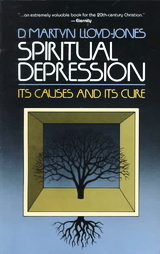 It is not only money. It may be some person for whom you are really living, your pleasure is in that one person. Beware, my friends; there are robbers and thieves who are bound to come and eventually rob you of these possessions. Take our possessions at their highest as well as their lowest, they are all subject to these robbers, these attacks. “The thieves break through and steal”, and we cannot prevent them. So our Lord appeals to our common sense, and reminds us that these worldly treasures never last. “Change and decay in all around I see.”
It is not only money. It may be some person for whom you are really living, your pleasure is in that one person. Beware, my friends; there are robbers and thieves who are bound to come and eventually rob you of these possessions. Take our possessions at their highest as well as their lowest, they are all subject to these robbers, these attacks. “The thieves break through and steal”, and we cannot prevent them. So our Lord appeals to our common sense, and reminds us that these worldly treasures never last. “Change and decay in all around I see.”
But look at the other, positive side. “Lay up for yourselves treasures in heaven, where neither moth nor rust corrupt, and where thieves do not break through nor steal.” This is wonderful and full of glory. Peter puts it in a phrase. He says “to an inheritance incorruptible, and undefiled, and that fades not away, reserved in heaven for you” (1 Peter 1.4). “The things which are not seen are eternal,” says St. Paul, it is the things which are seen that are temporal (2 Corinthians 4.18). These heavenly things are imperishable and the thieves cannot break through and steal. Why? Because God Himself is reserving them for us. There is no enemy that can ever rob us of them, or can ever enter in. It is impossible because God Himself is the Guardian.
Spiritual pleasures are invulnerable, they are in a place which is impregnable. “I am persuaded, that neither death, nor life, nor angels, nor principalities, nor powers, nor things present, nor things to come, nor height, nor depth, nor any other creature, shall be able to separate us from the love of God, which is in Christ Jesus our Lord” (Romans 8.38, 39).
Furthermore, there is nothing impure there. Naught that corrupts shall enter in. There is no sin there, nor element of decay. It is the realm of eternal life and eternal light. He dwells “in the light which no man can approach to”, as the apostle Paul puts it (1 Timothy 6.16). Heaven is the realm of life and light and purity, and nothing belonging to death, nothing tainted or polluted can gain admission there. It is perfect, and the treasures of the soul and of the spirit belong to that realm. Lay them up there, says our Lord, because there is no moth nor rust there, and no thief can ever break through nor steal.
It is an appeal to common sense. Do we not know that these things are true? Are they not true of necessity? Do we not see it all as we live in this world? Take up your morning newspaper and look at the death column. Look at all that is happening. We know all these things. Why do we not practice them and live accordingly? Why do we lay up treasures on earth when we know what is going to happen to them? And why do we not lay up treasures in heaven where we know that there is purity and joy, holiness and everlasting bliss?
That, however, is merely the first argument, the argument of common sense. But our Lord does not stop at that. His second argument is based upon the terrible spiritual danger involved in laying up treasures on earth and not in heaven. That is a general heading, but our Lord divides it into certain sub-sections.
The first thing against which He warns us in this spiritual sense is the awful grip and power of these earthly things upon us. You notice the terms He uses. He says, “Where your treasure is, there will your heart be also.” The heart! Then in verse 24 He talks about the mind. “No man can serve two masters” – and we should notice the word “serve”. These are the expressive terms He uses in order to impress upon us the terrible control that these things tend to exercise over us. Are we not all aware of them the moment we stop to think – the tyranny of persons, the tyranny of the world? This is not something we can think about at a distance as it were. We are all involved in this. We are all in the grip of this awful power of worldliness which really will master us unless we are aware of it.
But it is not only powerful, it is very subtle. It is the thing that really controls most men’s lives. Have you seen the change, the subtle change that tends to take place in men’s lives as they succeed and prosper in this world? It does not happen to those who are truly spiritual men, but if they are not, it invariably happens. Why is it that idealism is generally associated with youth and not with middle age and old age? Why do men tend to become cynical as they get older? Why does the noble outlook upon life tend to go? It is because we all become victims of treasures on earth, and if you watch you can see it in the lives of men.
Read the biographies. Many a young man starts out with a bright vision, but in a very subtle way – not that he falls into gross sin – he becomes influenced, perhaps when he is at college, by an outlook that is essentially worldly. Though it may be highly intellectual, he nevertheless loses something that was vital in his soul and spirit. He is still a very nice man and, moreover, just and wise, but he is not the man he was when he began. Something has been lost. Yes, this is a familiar phenomenon: “Shades of the prison house begin to close upon the growing boy.” Do we not all know something about it? It is there. It is a prison house, and it fastens itself on us unless we are aware of it. This grip, this power, masters us and we become slaves.
However, our Lord does not stop at the general. He is so anxious to show us this terrible danger that He works it out in detail. He tells us that this terrible thing that grips us tends to affect the entire personality, not merely part of us, but the whole man. And the first thing He mentions is the “heart”. Having laid down the injunction He says, “For where your treasure is, there will your heart be also.” These things grip and master our feelings, our affections and all our sensibility. All that part of our nature is absolutely gripped by them and we love them. Read John 3.19. “This is the condemnation, that light is come into the world, and men loved darkness rather than light, because their deeds were evil.” We love these things. We pretend that we only like them, but really we love them. They move us deeply.
The next thing about them is a little more subtle. They not only grip the heart, they grip the mind. Our Lord puts it in this way: “The light of the body is the eye. If therefore your eye be single, your whole body will be full of light. But if your eye be evil, your whole body will be full of darkness. If therefore the light that is in you is darkness, how great is that darkness!” (verses 22, 23). This picture of the eye is just His way of describing, by means of an illustration, the way in which we look at things. And according to our Lord, there are but two ways of looking at everything in this world.
There is what He calls the “single” eye, the eye of the spiritual man who sees things really as they are, truly and without any double view. His eye is clear and he sees things normally. But there is the other eye which He calls the “evil” eye, which is a kind of double vision, or, if you like, it is the eye in which the lenses are not clear. There are mists and opacities and we see things in a blurred way. That is the evil eye. It is colored by certain prejudices, colored by certain lusts and desires. It is not a clear vision. It is all cloudy, colored by these various tints and taints. That is what is meant by this statement which has so often confused people, because they do not take it in its context.
Our Lord in this picture is still dealing with the laying up of treasures. Having shown that where the treasure is, the heart will be also, He says that it is not only the heart but the mind as well. These are the things that control man.
Let us work out this principle. Is it not amazing to notice how much of our thought is based on these earthly treasures? The divisions in thought in almost every realm are almost entirely controlled by prejudice, not by pure thought. How very little thinking there is in this country at the time of a General Election for example. None of the protagonists reason. They simply present prejudices. How little thought there is on every side. It is so obvious in the political realm. But alas, it is not confined to politics. This blurring of the vision by love of earthly treasures tends to affect us morally also! How clever we all are at explaining that a particular thing we do is not really dishonest. Of course if a man smashes a window and steals jewelry he is a robber, but if I just manipulate my income tax return …. ! Certainly that is not robbery, we say, and we persuade ourselves that all is well. Ultimately there is but one reason for our doing these things, and that is our love of earthly treasures. These things control the mind as well as the heart. Our views and our whole ethical outlook are controlled by these things.
Even worse than that, however, our religious outlook is controlled by these things also. “Demas has forsaken me”, writes Paul. Why? “Having loved this present world.” How often this is seen in the matter of service. These are the things that determine our action, though we do not recognize it. Our Lord says in another place, “Take heed to yourselves, lest at any time your hearts be overcharged with surfeiting, and drunkenness, and cares of this life, and so that day come upon you unawares. For as a snare shall it come on all them that dwell on the face of the whole earth. Watch you therefore, and pray always, that you may be accounted worthy to escape all these things that shall come to pass, and to stand before the Son of man” (Luke 21.34-36). It is not only evil doing that dulls the mind and makes us incapable of thinking clearly. The cares of this world, settling down in life, enjoying our life and our family, any one of these things, our worldly position or our comforts – these are equally as dangerous as surfeiting and drunkenness. There is no doubt but that much of the so-called wisdom which men claim in this world is nothing, in the last analysis, but this concern about earthly treasures.
But lastly, these things not only grip the heart and mind, they also affect the will. Says our Lord, “No man can serve two masters”; and the moment we mention the word “serve” we are in the realm of the will, the realm of action. You notice how perfectly logical this is. What we do is the result of what we think, so what is going to determine our lives and the exercise of our wills is what we think, and that in turn is determined by where our treasure is – our heart.
So we can sum it up like this. These earthly treasures are so powerful that they grip the entire personality. They grip a man’s heart, his mind and his will. They tend to affect his spirit, his soul and his whole being. Whatever realm of life we may be looking at, or thinking about, we will find these things are there. Everyone is affected by them. They are a terrible danger.
But the last step is the most solemn and serious of all. We must remember that the way in which we look at these things ultimately determines our relationship to God. “No man can serve two masters, for either he will hate the one, and love the other; or else he will hold to the one, and despise the other. You cannot serve God and mammon.” This is indeed a very solemn thing, and that is why it is dealt with so frequently in Scripture. The truth of this proposition is obvious. Both make a totalitarian demand upon us. Worldly things really do make a totalitarian demand as we have seen. How they tend to grip the entire personality and affect us everywhere! They demand our entire devotion. They want us to live for them absolutely.
Yes, but so does God. “You shall love the Lord your God with all your heart, and with all your soul, and with all your mind, and with all your strength.” Not in a material sense necessarily, but in some sense or other He says to us all, “Go, sell all that you have, and come, follow me.” “He who loves father or mother more than me is not worthy of me, and he that loves son or daughter more than me is not worthy of me.” It is a totalitarian demand.
Notice it again in verse 24. “Either he will hate the one, and love the other, or else he will hold to the one, and despise the other.” It is “either—or”. Compromise is completely impossible at this point. “You cannot serve God and mammon.”
This is something which is so subtle that many of us miss it completely at the present time. Some of us are violent opponents of what we speak of as “atheistic materialism”. But lest we may feel too happy about ourselves because we are opponents of that, let us realize that the Bible tells us that all materialism is atheistic. You cannot serve God and mammon. It is impossible. So if a materialistic outlook is really controlling us, we are godless, whatever we may say. There are many atheists who speak religious language, but our Lord tells us here that even worse than atheistic materialism is a materialism that thinks it is godly. “If the light that is in you be darkness, how great is that darkness!”
The man who thinks he is godly because he talks about God, and says he believes in God, and goes to a place of worship occasionally, but is really living for certain earthly things – how great is that man’s darkness! There is a perfect illustration of that in the Old Testament. Study carefully 2 Kings 17.24-41. Here is what we are told. The Assyrians conquered some area. Then they took their own people and settled them in that area. These Assyrians of course did not worship God. Then some lions came and destroyed their property. “This”, they said, “has happened to us because we do not worship the God of this particular land. We will get priestly instruction on this.” So they found a priest who instructed them generally in the religion of Israel. And then they thought that all would be well. But this is what Scripture said about them, they “feared the Lord, and served their graven images.”
What a terrible thing that is. It alarms me. It is not what we say that matters. In the last day many shall say, “Lord, Lord, have we not done this, that and the other?” But He will say to them, “I never knew you”. “Not every one who says to me Lord, Lord, will enter into the kingdom of heaven, but he who does the will of my Father.” Whom do you serve? That is the question, and it is either God or mammon. There is nothing in the last analysis that is so insulting to God as to take His name on us and yet to show clearly that we are serving mammon in some shape or form. That is the most terrible thing of all. It is the greatest insult to God; and how easily and unconsciously we can all become guilty of this.
I remember once hearing a preacher tell a story which he assured us was simple, literal truth. It illustrates perfectly the point which we are considering. It is the story of a farmer who one day went happily and with great joy in his heart to report to his wife and family that their best cow had given birth to twin calves, one red and one white. And he said, “You know I have suddenly had a feeling and impulse that we must dedicate one of these calves to the Lord. We will bring them up together, and when the time comes we will sell one and keep the proceeds, and we will sell the other and give the proceeds to the Lord’s work.”
His wife asked him which he was going to dedicate to the Lord. “There is no need to bother about that now,” he replied, “we will treat them both in the same way, and when the time comes we will do as I say.” And off he went. In a few months the man entered his kitchen looking very miserable and unhappy. When his wife asked him what was troubling him, he answered, “I have bad news to give you. The Lord’s calf is dead.” “But”, she said, “you had not decided which was to be the Lord’s calf.” “Oh yes,” he said, “I had always decided it was to be the white one, and it is the white one that has died. The Lord’s calf is dead.”
We may laugh at that story, but God forbid that we should be laughing at ourselves. It is always the Lord’s calf that dies. When money becomes difficult, the first thing we economize on is our contribution to God’s work. It is always the first thing to go. Perhaps we must not say “always”, for that would be unfair, but with so many it is the first thing, and the things we really like are the last to go. “We cannot serve God and mammon.” These things tend to come between us and God, and our attitude to them ultimately determines our relationship to God.
The mere fact that we believe in God, and call Him, Lord, Lord, and likewise with Christ, is not proof in and of itself that we are serving Him, that we recognize His totalitarian demand, and have yielded ourselves gladly and readily to Him. “Let every man examine himself.”
Assignment: What part of this sermon convicted you the most?
 “The mind of this country, taught to aim at low objects, eats upon itself.” Ralph Waldo Emerson offered that observation in 1837, but his words echo with painful prescience in today’s very different United States. Americans are in serious intellectual trouble — in danger of losing our hard-won cultural capital to a virulent mixture of anti-intellectualism, anti-rationalism and low expectations.
“The mind of this country, taught to aim at low objects, eats upon itself.” Ralph Waldo Emerson offered that observation in 1837, but his words echo with painful prescience in today’s very different United States. Americans are in serious intellectual trouble — in danger of losing our hard-won cultural capital to a virulent mixture of anti-intellectualism, anti-rationalism and low expectations. 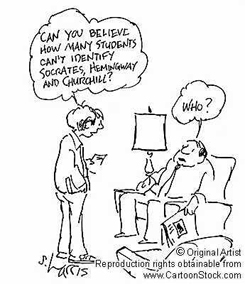 Despite an aggressive marketing campaign aimed at encouraging babies as young as 6 months to watch videos, there is no evidence that focusing on a screen is anything but bad for infants and toddlers. In a study released last August, University of Washington researchers found that babies between 8 and 16 months recognized an average of six to eight fewer words for every hour spent watching videos.
Despite an aggressive marketing campaign aimed at encouraging babies as young as 6 months to watch videos, there is no evidence that focusing on a screen is anything but bad for infants and toddlers. In a study released last August, University of Washington researchers found that babies between 8 and 16 months recognized an average of six to eight fewer words for every hour spent watching videos. 









